5 start with Y start with Y
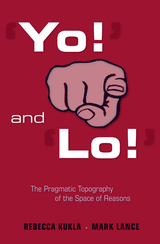
Much of twentieth-century philosophy was organized around the “linguistic turn,” in which metaphysical and epistemological issues were approached through an analysis of language. This turn was marked by two assumptions: that it was primarily the semantics of language that was relevant to broader philosophical issues, and that declarative assertions were the only verbal acts of serious philosophical interest. In ‘Yo!’ and ‘Lo!’ Rebecca Kukla and Mark Lance reject these assumptions. Looking at philosophical problems starting with the pragmatics of language, they develop a typology of pragmatic categories of speech within which declaratives have no uniquely privileged position. They demonstrate that non-declarative speech acts—including vocative hails (“Yo!”) and calls to shared attention (“Lo!”)—are as fundamental to the possibility and structure of meaningful language as are declaratives.
Entering into conversation with the work of Anglo-American philosophers such as Wilfrid Sellars, Robert Brandom, and John McDowell, and Continental philosophers including Heidegger and Althusser, ‘Yo!’ and ‘Lo!’ offers solutions (or dissolutions) to long-standing philosophical problems, such as how perception can be both inferentially fecund and responsive to an empirical world, and how moral judgment can be both objective and inherently motivating.
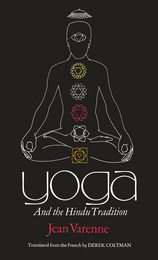
This excellent translation, including line drawings and charts, a glossary of technical terms, and a complete translation of the Yoga Darshana Upanishad, begins with a brief description of the metaphysical and religious history on which Yoga is based. Varenne discusses the theoretical conception of Yoga as the search for liberating knowledge, concluding with a brief indication of the physical practices and extra Yogic themes such as Kundalini and Tantrism. It is the author's hope that "those who read [this book] will come to realize that it is in fact dishonest to reduce Yoga to some sort of physical training, or to just an occult doctrine; it is a 'world view' a Weltanschauung that comprehends reality in its totality."
"The straightforward, well-organized presentation makes the book itself a microcosm of what Varenne singles out as a dominant feature of classical Hindu thought—a bringing of the complex and multitudinous into a unity."—Judith Guttman, Yoga Journal
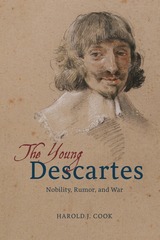
In The Young Descartes, Harold J. Cook tells the story of a man who did not set out to become an author or philosopher—Descartes began publishing only after the age of forty. Rather, for years he traveled throughout Europe in diplomacy and at war. He was present at the opening events of the Thirty Years' War in Central Europe and Northern Italy, and was also later involved in struggles within France. Enduring exile, scandals, and courtly intrigue, on his journeys Descartes associated with many of the most innovative free thinkers and poets of his day, as well as great noblemen, noblewomen, and charismatic religious reformers. In his personal life, he expressed love for men as well as women and was accused of libertinism by his adversaries.
These early years on the move, in touch with powerful people and great events, and his experiences with military engineering and philosophical materialism all shaped the thinker and philosopher Descartes became in exile, where he would begin to write and publish, with purpose. But though it is these writings that made ultimately made him famous, The Young Descartes shows that this story of his early life and the tumultuous times that molded him is sure to spark a reappraisal of his philosophy and legacy.
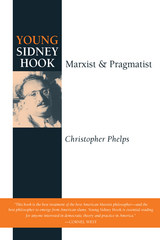
"This book is the best treatment of the best American Marxist philosopher-and the best philosopher to emerge from American slums. Young Sidney Hook is essential reading for anyone interested in democratic theory and practice in America."
---Cornel West
"A very detailed, and fascinating account of Hook's formative years . . . [a] first-rate contribution to the history of American leftist intellectual life."
---Richard Rorty, Raritan
"Fascinating . . . well researched and packed with information."
---Times Literary Supplement
"Succeeds in establishing the young Hook as a dedicated revolutionary Marxist."
---Amos Perlmutter, Washington Times
"A brilliant, lucid portrait of a scholar, adversarial by temperament, who turned his extraordinary powers of analysis and polemic successively against capitalism, Stalinism, and the New Left."
---Alan Wald, Monthly Review
"The best study of Hook's thought. . . . Supersedes all earlier treatments."
---David A. Hollinger and Charles Capper, The American Intellectual Tradition
"A major contribution to our understanding of Hook and the American Marxist tradition. . . . Extremely insightful."
---American Studies
"Persuasive. . . . Discovers not just a brilliant interpreter of Marx and the Russian Revolution, but a remarkable advocate and practitioner of the Americanization of Marxism."
---In These Times
"Phelps's effort to uncover, explore, and analyze Hook's forgotten leftism must be judged an unqualified success."
---Left History
"Penetrating, closely argued, and lucid. . . . An important contribution to the history of American radicalism in the 1930s."
---Labor History
One of the most controversial figures in the history of American philosophy, Sidney Hook was "an intellectual street fighter," who began his career as a brilliant Marxist thinker and "probably the greatest polemicist of [the 20th] century" (Edward Shils) before breaking with the Communist Party in the late 1930s. Turning in his later years to an allegiance with American conservatives including Richard Nixon and Ronald Reagan, Hook is now widely known as an intellectual father of the neoconservative movement.
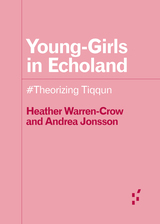
Who’s worse, the Young-Girl or the Man-Child?
Tiqqun’s Preliminary Materials for a Theory of the Young-Girl is a controversial work of anticapitalist philosophy that has attracted musicians, playwrights, feminist theorists, and men's-rights activists since its publication in 1999. More than twenty years after its publication the international reverberation of Young-Girls shows no signs of weakening.
Young-Girls in Echoland: #Theorizing Tiqqun is a guide to this ongoing postdigital conversation, engaging with artworks and textual criticism provoked by Tiqqun’s audacious, arguably misogynistic textual voice. Heather Warren-Crow and Andrea Jonsson show how Tiqqun’s polarizing figure has grown and matured but also stayed unapologetically girly in the works of artists and scholars discussed here. Rethinking the myth of Echo and Narcissus by performing a different kind of listening, they take us on a journey from VSCO girls to basic bitches to vampires.
With an ear for the sound of Tiqqun’s polemic and its ensemble of Anglophone and Francophone rejoinders, Young-Girls in Echoland offers a model for analyzing the call-and-response of pop philosophy and for hearing the affective rhythms of communicative capitalism.
Forerunners: Ideas First is a thought-in-process series of breakthrough digital publications. Written between fresh ideas and finished books, Forerunners draws on scholarly work initiated in notable blogs, social media, conference plenaries, journal articles, and the synergy of academic exchange. This is gray literature publishing: where intense thinking, change, and speculation take place in scholarship.
READERS
Browse our collection.
PUBLISHERS
See BiblioVault's publisher services.
STUDENT SERVICES
Files for college accessibility offices.
UChicago Accessibility Resources
home | accessibility | search | about | contact us
BiblioVault ® 2001 - 2024
The University of Chicago Press









